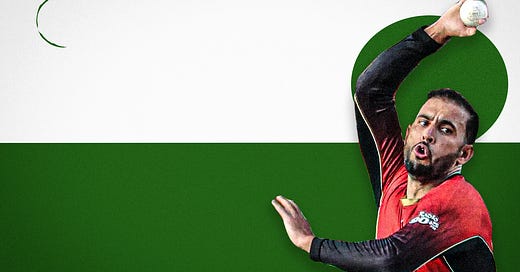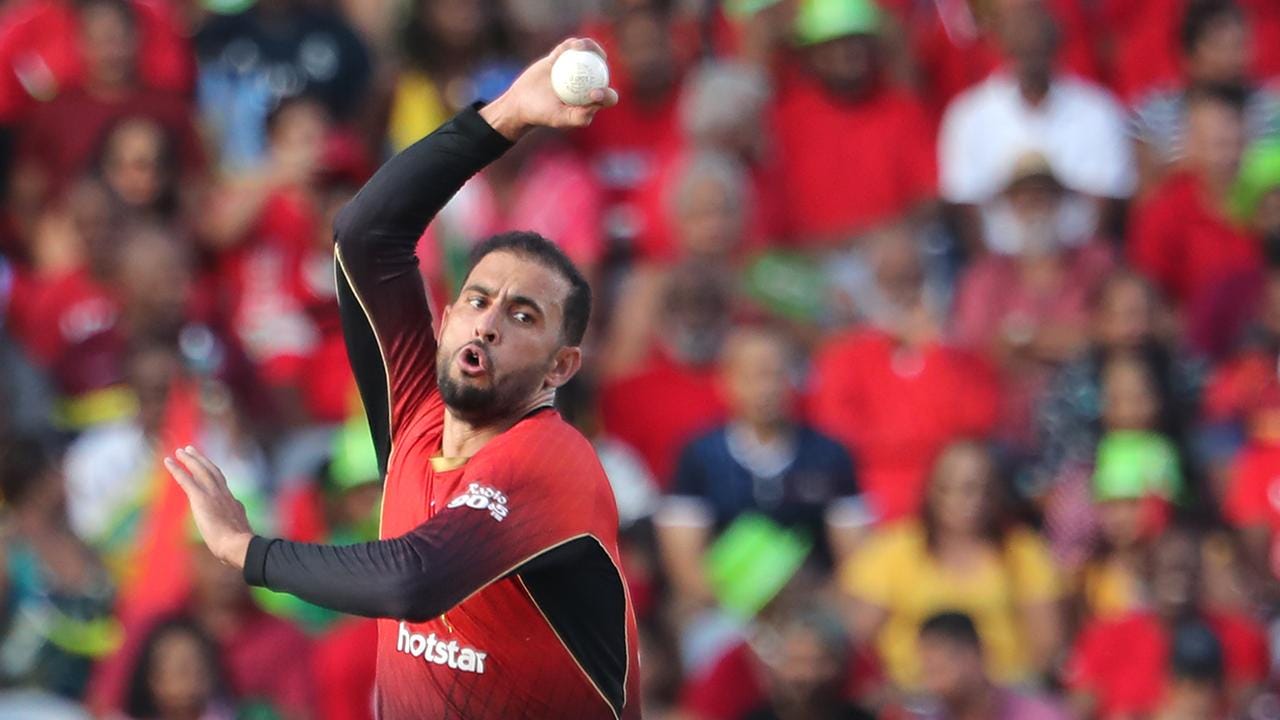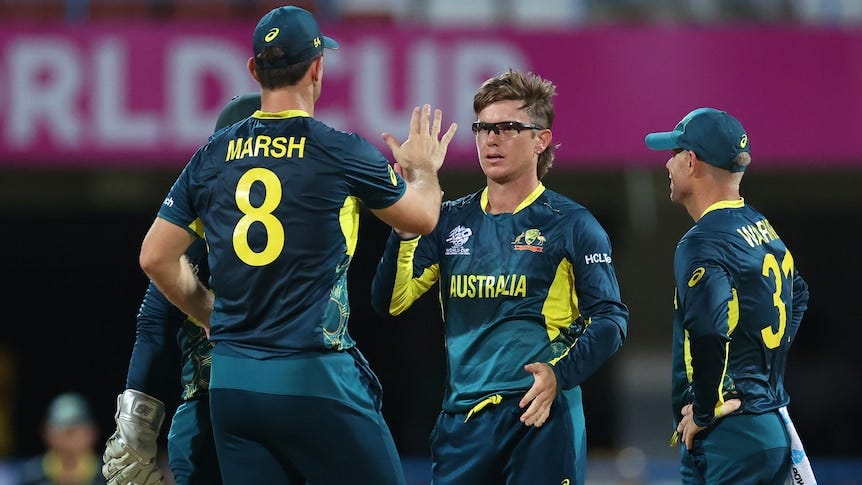Learning from the best
Wrist spin in the Caribbean with Fawad Ahmed - where most of his predictions are coming true this WC
This article was originally published in Wisden: The Nightwatchman, issue 46 (Summer, 2024)
“Hang on, let me put on an old cap for this. What do you think, maybe one of Davey Warner’s Australian ones because we are talking about T20 cricket?”
Fawad Ahmed and David Warner shared a dressing room in both of Fawad’s T20’s for Australia. Clearly, they shared some team kit and an enduring friendship, too, because the leg-spinner could have picked out apparel from any of the eighteen professional outfits he has represented.
A subtle nod to his friend’s record, Warner will be making his final international appearance at the World Cup. And, barring disaster, will finish it as Australia’s most prolific run-getter in the format.
“Ok, I'm right to go now,” Fawad laughs, adjusting the canary yellow cap just so.
Fawad - still playing, having claimed 59 wickets at 8.78 in the 2023/24 season for Hoppers Crossing in Victoria - is a veteran of five internationals for his adopted country and more than 250 First Class, List A and domestic T20 matches, and few things engage him more than the craft of leg-spin bowling. So, ready to talk tweakers, he is quick to switch into serious mode.
He is also quick to caution that despite his wealth of experience and bountiful success in the Caribbean, things will go up a notch for the spinners over the next month.
“Obviously there is a big gap between bowling in the Caribbean Premier League (CPL), and what is coming up at the World Cup. It is a different mentality and different pressure.”
That said, Fawad was consistently one of the best performers during his time in the CPL. A winner in three of his four seasons there and player of the tournament in 2018, he claimed 56 wickets across 44 matches at less than 18-runs apiece, alongside a miserly career economy rate of 6.39.
A tournament that helped to kickstart his career as a short-form franchise player, Fawad has fond memories of his time in the Caribbean.
“Personally, I was in a really good head space when I first started there in 2018,” he recalls. “I had just finished my red ball cricket and was moving into the next phase of my career. At that time, I was also looking to put my name forward for the 2019 World Cup.”
It was with those factors at play that Fawad sought advice before joining the Trinbago Knight Riders for the first time. No stranger to research – he has a degree in political science and international relations – Fawad was diligent in learning what it would take to succeed in this new part of the world.
What he quickly came to understand was that it would be different from anything he had done before.
“What I learnt was that there are two completely different kinds of cricket over there,” he explains. “During the daytime it turns big, real big when it is hot and muggy. At nighttime, it gets so wet with the dew and the wickets become very skiddy.”
This will be the second consecutive Men’s T20 World Cup where dew will play a role – perhaps it is nature’s answer to the IPL’s Impact Player – and Fawad cites The Brian Lara Cricket Academy in Trinidad and Guyana’s Providence Stadium as the two “wettest” once the sun sets.
He met the challenge by dumping his practice balls in a bucket of water and quickly became comfortable bowling with a scrambled seam.
“That was the best solution for me. Firstly, because it is easier to control than holding the ball down a wet seam and it is also much harder for a batter to work out which way it is spinning.
“If they don’t pick it from the hand, then it’s game over.”
Hard to pick from the hand at the best of times, Fawad notes that the moisture levels in the air can actually make the ball harder to see, too.
Confident this wasn’t just his eyesight fading with age, ‘Fuzzy’ says things can get, well, fuzzy.
“With so much moisture in the air, you can find that the lights aren’t always so effective. It can feel almost a bit foggy, so that makes it even harder for batters to pick up the subtle changes you are making.”
It was these changes – an armory of variations – that Fawad went on to exploit throughout his time in the CPL.
“To be honest, I won three titles there because I relied on variations. I went over with a lot, and I used them all. Especially in the skidding conditions at nighttime that will be key.”
He describes the wrong’un and the slider as his main weapons, the former because it was hard to pick and the latter because it was hardest to play, especially whem employed along with an array of leg-spinners.
He goes on to outline the perfect set up:
“You can bowl six leg-spinners an over, all different ones. There is a small one, a medium one, a big turning one. The one with a scrambled seam, the straight seam, the big drift in, or a little less drift. Just in the leg-spin there is lots of variation.”
And for a batter who gets through that over with their wicket intact?
“I always liked to show the batsman the big spinning leg-break early. If they see that, they are not going to come down the wicket. Then they are playing from the crease; they want to sweep, to cut and pull. That's when you mix up the pace, use the slider, the wrong’un and the topspinner.
“From there it is easier to get them out.”
Excited to see the world’s legion of leg-spinners in action this month, Fawad is confident that conditions in the Caribbean – which is where Australia will play all their matches – suit Adam Zampa down to the dew laden ground.
Not a prodigious turner of the ball, the two-time World Cup winner instead relies on unerring accuracy, and a length that traps batters with nowhere to go.
Zampa’s accuracy was key in the 2021 World Cup, and Fawad believes his pace and variation will underpin his success again.
“His energy at the crease, combined with the hard length that he bowls means the batter needs to pick it to know if it will bounce or skid. Plus, because he never leaves the stumps, batters think they can pull or step-hit. It is never there to play against Zampa. He will hit a lot of pads.”
With matches set to be played in the heat of the day as well, Fawad notes that – paradoxically – prodigious turn can pose a different challenge for the spinners.
Their threat somewhat reduced if the ball is turning too far off the line of the stumps, Fawad details that in these conditions, the answer is found in the air, rather than off the wicket.
“I actually found it harder when the ball was spinning a lot, but the key is to slow things right down. In this format the batters want to get at you and hit hard to short boundaries, so the slower it is – when combined with big turn – that is the best way to deceive in the daytime.”
Before we can take the conversation north to the niceties of cricket in New York, Fawad is at pains to stress it a final time.
“As I have said throughout, the matches in the West Indies will have two different kinds of game at hand. Day versus night.”
If Caribbean cricket is dictated to by the time of day; how about in a city that never sleeps?
***
"I love New York on summer afternoons when everyone’s away. There's something very sensuous about it – overripe, as if all sorts of funny fruits were going to fall into your hands.” - Jordan Baker in F. Scott Fitzgerald’s The Great Gatsby.
Jordan would be in for a rude shock this summer, then, with fans set to pile into the Nassau County International Cricket Stadium east of Manhattan. Purpose built for the World Cup and set to play host to eight matches including cricket’s greatest rivalry between India and Pakistan, how its Damian Hough prepared pitch plays will be a source of intrigue.
Though unlikely to serve up any kind of “funny fruits,” Fawad believes that playing in a new environment should primarily comfort bowlers.
“Batters will always be more cautious and apprehensive in a new stadium and on an unknown surface. Bowlers should be aware of that and take some confidence from it.”
That said, he is hesitant to overegg its importance. Not only because drop-in wickets are becoming more common, but because T20 is taking the game to venues not traditionally home to cricket.
In the Big Bash League alone, Geelong, Marvel Stadium and the Sydney Showgrounds all started their lives as Australian Rules grounds and learning to perform there is just part of the territory for professionals.
“Ultimately, if you tick all the boxes as a bowler, you can’t be worrying about what else is happening in terms of the surface,” Fawad concludes. “You come to understand that your own work, preparation and skill is 95% of the battle.
“That’s what all of these bowlers understand, and it is why they are playing at the World Cup.”
If you made it this far, why not consider supporting The Boundary Rider?








This is a fantastic piece Andrew! Definitely going in today's recommendations!